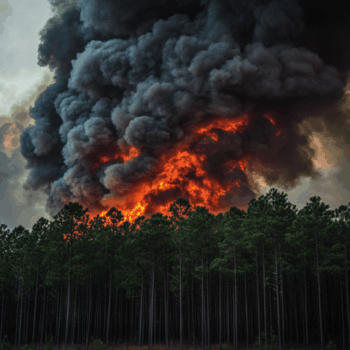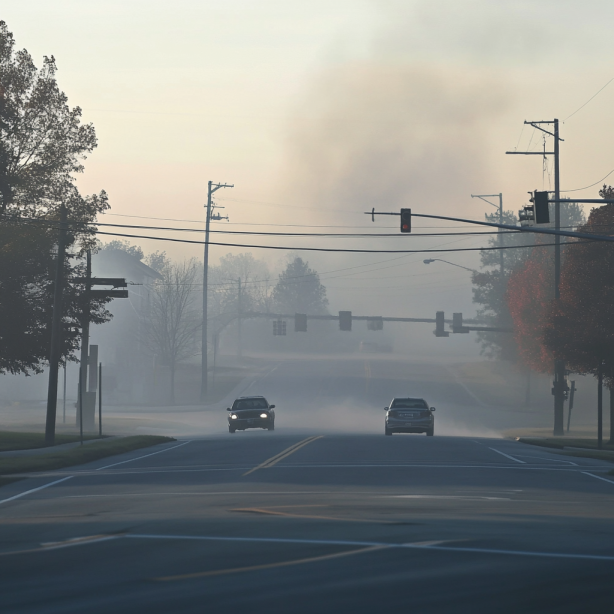How to Take Legal Action Following the Rockdale County BioLab Fire
The Rockdale County BioLab fire is a painful reminder of the dangers posed by chemical facilities and the devastating impact they can have on our communities. For those who have been affected, the road to recovery may be long, but know that Henningsen Injury Attorneys are here to help.
Putting you on a better path to recovery and getting the compensation you deserve, our team of experienced lawyers are ready to provide you with the legal resources and advice you need.
If you’re looking for answers, look no further than Todd Henningsen and his legal team. Reach out to our law firm today: 404-882-6810.

The sight of the Rockdale County BioLab fire that occurred in the early hours of September 29, 2024, was nothing short of apocalyptic. Suffocating the city of Conyers, Georgia, and its neighboring areas, with its intensity, the inferno was spectacular, yet immensely terrifying in equal measure.
The scale of the disaster was, and still is undeniable. It’s a stark reminder of the risks inherently associated with chemical facilities and how they can potentially pose danger to individuals (and even wildlife) when safety measures fail.
For the 17,000 residents forced to evacuate, this incident was a chilling reality of the risks to their health and safety. It wasn’t just something they could see—it could be felt, smelled, and feared.
In this article, we’ll explore the ongoing health risks faced by those affected by the BioLab fire, the legal recourse available for victims who may experience debilitating symptoms as a result of catastrophic injuries, and why swift action is essential to secure the justice and compensation justly owed to them.
The Immediate Impact of the BioLab Fire in Rockdale County
What started as a sprinkler malfunction at the BioLab facility quickly escalated into a full-blown disaster. By noon, the fire was briefly under control, but a second reignition in the afternoon caused it to erupt again, leading to massive evacuations and widespread fear throughout Rockdale County, Georgia.
Roughly 17,000 residents were forced to evacuate from the surrounding area as dangerous chemicals, including <strong>chlorine and chlorine compounds</strong>, filled the air. Interstate 20 was closed for hours, and the local authorities issued a shelter-in-place order for the entire county. The scale of the fire and the quick, coordinated response of emergency services made headlines across the state of Georgia.
Still, the immediate response couldn’t mitigate the potential long-term consequences of the chemical plume that lingered over Rockdale County.

Health Risks Posed by Chemical Exposure
The chemicals released during the fire—chlorine, chloramine, and other chlorine compounds—can pose serious health risks to workers, residents, and even first responders. Exposure to remnants of the blaze, individuals exposed may experience the following symptoms:
- Eye and airway irritation
- Coughing
- Shortness of breath
- Headaches
For individuals with pre-existing respiratory conditions, these symptoms could potentially be far more severe as chemical exposure from fires occurring in workplaces like this one can have long-term effects that may not manifest immediately.
Chlorine exposure typically occurs through inhalation, as chlorine is a gas at room temperature. Chlorine gas is heavier than air and tends to concentrate in poorly ventilated or low-lying areas, potentially increasing the risk of asphyxiation in those locations. While the odor of chlorine serves as a warning sign for most, prolonged low-level exposure may lead to olfactory fatigue, reducing the ability to detect the gas.
Children are considered to be at higher risk due to their greater lung surface area relative to body weight and their increased minute ventilation.
Long-Term Effects of Chlorine Exposure
Chronic exposure to chlorine, particularly after incidents like the Rockdale County BioLab fire, can lead to prolonged health complications. According to the CDC, potential long-term effects include:
- Reactive Airways Dysfunction Syndrome (RADS). A chemical irritant-induced type of asthma that can develop after exposure to high levels of chlorine. Symptoms can include ongoing respiratory issues such as coughing, wheezing, and shortness of breath.
- Corrosion of the teeth: Long-term, repeated exposure to chlorine can result in damage to dental enamel.
- Chronic respiratory conditions: Prolonged exposure may cause or exacerbate asthma, bronchitis, and other chronic lung diseases. The damage to lung tissue from severe exposure may take weeks to heal, with a risk of lasting impairment.
In severe cases of chlorine exposure, individuals may experience persistent pulmonary symptoms or prolonged lung impairment, even after initial recovery. While pulmonary function may return to normal within 7 to 14 days after acute exposure, some individuals may experience long-term symptoms, particularly if they have pre-existing respiratory conditions.
Ongoing Concerns and Monitoring Following the BioLab Fire
As of mid-October 2024, a mere two weeks following the fire, a plume of smoke continues to hover over parts of Rockdale County due to the over-gassing of products during the fire. Residents are still being advised to shelter in place if they smell chlorine or if the plume moves over their area. Currently, the Environmental Protection Agency (EPA) and the Georgia Environmental Protection Division (EPD) are monitoring the situation, but many questions remain unanswered about the full extent of the contamination.
Local authorities and environmental groups are working tirelessly to track air quality levels, but the uncertainty is understandably creating mounting anxiety in the community.
Legal Recourse for BioLab Fire Victims
For the thousands affected by the BioLab fire, the health risks are not the only concern. The potential financial burden of medical bills, missed work, and long-term care can add up quickly. Fortunately, those who have suffered as a direct result of the fire may have legal recourse.
Individuals who may have grounds to pursue compensation include:
- Workers: Those exposed to toxic chemicals during the blaze may seek compensation through work injury claims. In cases of negligence, they may also file personal injury lawsuits.
- Residents: People who lived near the plant and experienced health issues due to the chemical plume may file personal injury claims against the responsible parties.
- Emergency Responders: First responders exposed to harmful chemicals during the fire may also have grounds to pursue compensation if negligence is proven.
Compensation may cover a range of economic and non-economic damages, including:
- Medical expenses
- Lost wages
- Pain and suffering
- Future medical care for chronic health conditions
Given the scale of this incident, and the fact that it follows several similar fires at the BioLab facility, legal experts are already investigating the possibility of employer negligence. If BioLab failed to follow proper safety protocols or did not adequately maintain its fire suppression systems, they could be held liable for the damages caused by the fire. Past incidents at the facility, including:
- A 2004 fire that forced the evacuation of 300 people
- A 2020 chemical fire that led to further evacuations and road closures
These incidents highlight the potential for repeated safety failures and strengthen the case for victims seeking legal action.

Statute of Limitations in Georgia
Time is of the essence for anyone considering legal action related to the BioLab fire. Under Georgia law, personal injury claims must be filed within a specific time frame, known as the statute of limitations. For chemical exposure cases, victims typically have two years from the date of the incident to file a lawsuit.
However, due to the delayed onset of symptoms in some chemical exposure cases, the Georgia statute of limitations may not begin until the victim becomes aware of their injuries. This makes it critical for those who suspect they’ve been affected by the BioLab fire to consult with an attorney as soon as possible to determine their legal options and ensure they don’t miss the deadline to file a claim.
Employer Liability and Negligence
In cases like the BioLab fire, employer negligence often plays a significant role in the outcome of personal injury claims. Employers are required to provide a safe working environment and adhere to all Occupational Safety and Health Administration regulations. If BioLab failed to maintain its fire suppression systems or ignored critical safety measures, they could be held accountable for the damage caused.
Negligence can also extend beyond the company itself. If third-party contractors or maintenance crews were responsible for ensuring that the chemical storage areas were safe and failed to do so, they too could be liable. This makes a thorough investigation into the cause of the fire crucial for those pursuing legal action.



